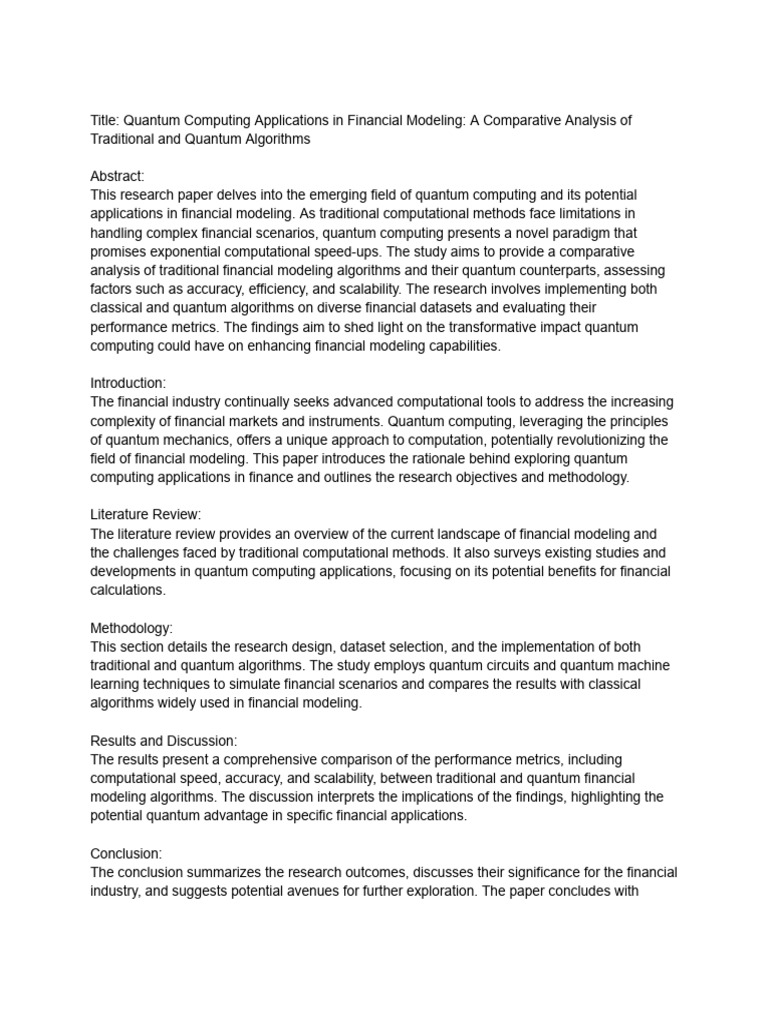In the realm of financial trading, where rapid decision-making is paramount, the emergence of quantum computing represents a profound paradigm shift. The traditional constraints of classical computing, characterized by binary systems and linear processing capabilities, are dismantled as quantum computing introduces principles from quantum mechanics into computational processes. This technological upheaval not only facilitates unprecedented speed and efficiency in data processing but also opens avenues for novel trading strategies that were previously inconceivable. As such, understanding the potential ramifications of quantum computing on trading strategies is a multifaceted endeavor that necessitates exploration.
A primary consideration is the enhanced computational power afforded by quantum algorithms. Quantum computing harnesses the principles of superposition and entanglement, allowing it to perform multiple calculations simultaneously. For traders, this translates into the capacity to analyze vast datasets in real time, enabling more nuanced insights into market trends and anomalies. Traditional algorithms often struggle with the exponential complexity inherent in financial markets; hence, the ability to process extensive information rapidly allows quantum traders to identify opportunities that would elude their classical counterparts.
Furthermore, the introduction of quantum annealing, a quantum optimization technique, holds significant promise for portfolio management. Quantum annealers can assess numerous possible configurations of a portfolio to optimize risk-adjusted returns. This stochastic approach allows for a more sophisticated understanding of asset correlations and market dynamics, facilitating strategies that are adaptable to changing environments. In contrast to classical optimization methods, which can be hindered by local minima, quantum annealing can traverse the solution landscape with greater efficacy, leading to potentially more lucrative investment strategies.
Moreover, the realm of algorithmic trading is poised for transformation. Quantum computers can enhance predictive models through improved machine learning capabilities. Current machine learning frameworks, while effective, often face limitations with the dimensionality of data and computational intensity. Quantum-enhanced machine learning offers exponential speed-ups in training and processing, leading to richer predictive analytics that incorporate a broader spectrum of variables, including sentiment analysis derived from social media or real-time geopolitical developments. This rich tapestry of data can inform trading decisions and facilitate the creation of adaptive strategies that respond in kind to market fluctuations.
However, with the opportunities presented by quantum computing also come substantial challenges, particularly in the realm of quantitative finance. The nature of financial markets is inherently stochastic; thus, the introduction of quantum computing necessitates the re-evaluation of risk and uncertainty perspectives. The precision and rapidity of quantum algorithms could amplify volatility, as more traders employ similar techniques yielding rapid buy and sell actions. This herd behavior can precipitate market dislocations, where the dynamics of supply and demand shift dramatically in condensed timeframes, resulting in unintended consequences.
The advent of quantum computing also ignites questions about market fairness and ethical considerations. As the technology becomes accessible, a substantial divide may emerge between institutions possessing quantum capabilities and those without. This disparity could engender an uneven playing field, exacerbating existing inequalities in trading and investment acumen. With quantum trading strategies becoming mainstream, regulatory bodies may encounter challenges in maintaining market integrity. Consequently, the integration of quantum computing necessitates not only technological adaptation but a cohesive dialogue regarding the ethics of algorithmic decision-making in finance.
Another pivotal aspect lies in the modeling of complex financial instruments and derivatives. The intricate nature of these financial products requires robust mathematical frameworks to ensure accurate pricing and risk assessment. Quantum computing, through its capacity to model intricate states and variable interactions efficiently, may refine these frameworks considerably. The implicit relationships between underlying assets can be modeled more accurately, leading to a more refined understanding of pricing dynamics. Traders employing quantum-enhanced models could achieve superior performance through better hedging strategies and risk management techniques.
Not to be overlooked is the impact of quantum computing on high-frequency trading (HFT). The speed advantage typically enjoyed by HFT strategies could be further amplified through quantum algorithms capable of executing trades in fractions of a second, predicated on real-time data analysis. The integration of quantum computing into HFT may recalibrate the competitive landscape, compelling traders to adopt quantum strategies to maintain market relevance. This rapid pace raises fundamental questions about market liquidity and order execution efficiency, and highlights the necessity for evolving trading infrastructure.
Lastly, as quantum computing enters the financial domain, collaboration between physicists, computer scientists, and financial analysts will necessitate a reexamination of educational curricula in trading schools. A comprehensive understanding of quantum mechanics as it relates to computational algorithms will become increasingly crucial for the next generation of traders and financial strategists. Fostering interdisciplinary knowledge could yield innovative trading applications that capitalize on the technology’s unique capabilities.
In summary, the persistent exploration of how quantum computing will affect trading strategies unveils a complex interplay of enhancement, challenge, and ethical considerations. As the financial landscape shifts to accommodate this emerging technology, traders must navigate the waters of quantum advantage with diligence and foresight. The future promises not only the refinement of established practices but the illumination of new strategies that could redefine market dynamics entirely. Embracing quantum computing will undoubtedly shape the trajectory of trading strategies, heralding a new era of financial innovation.












